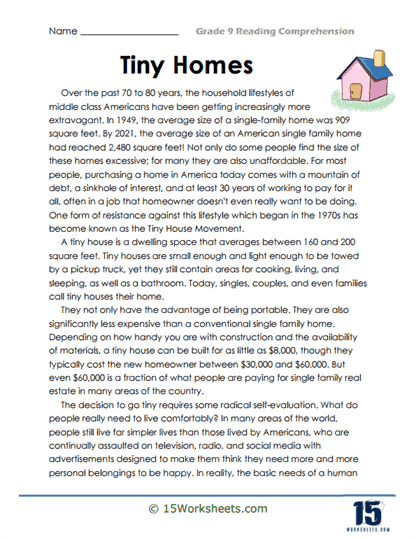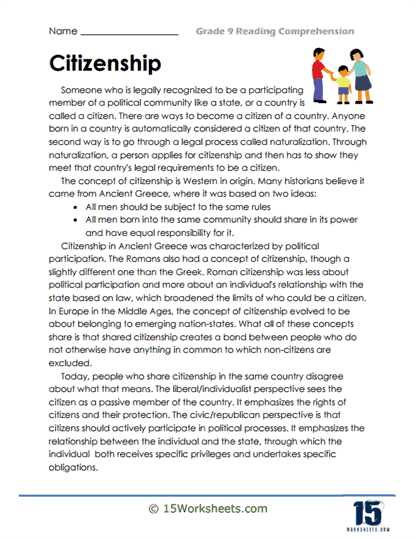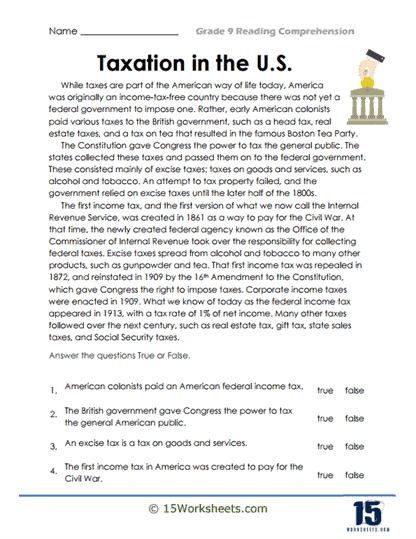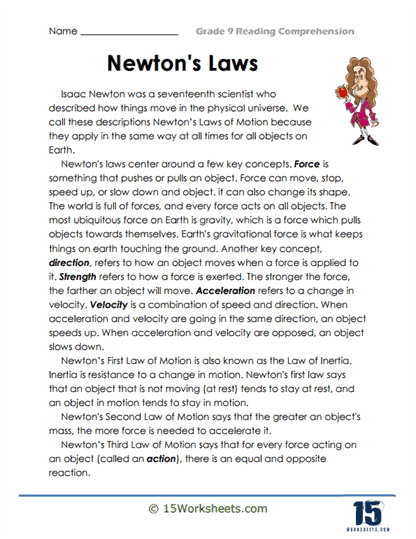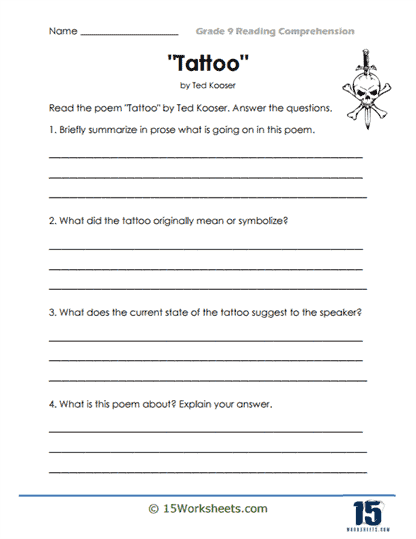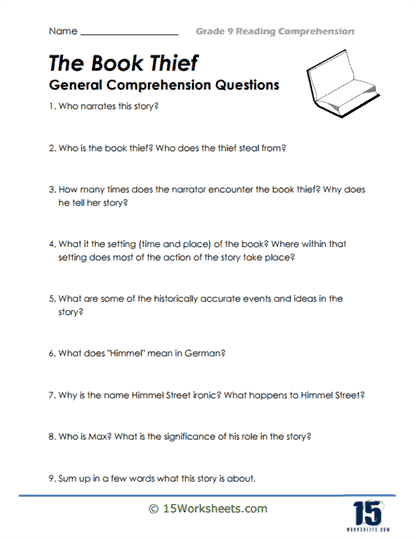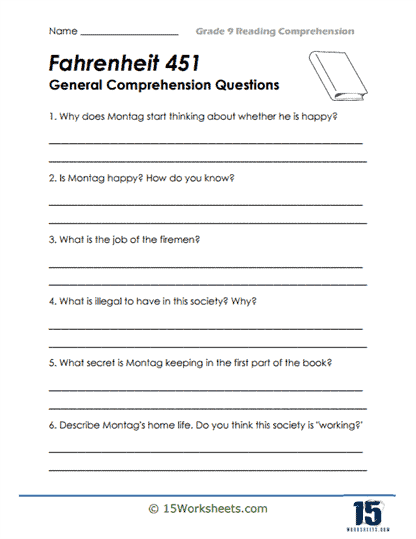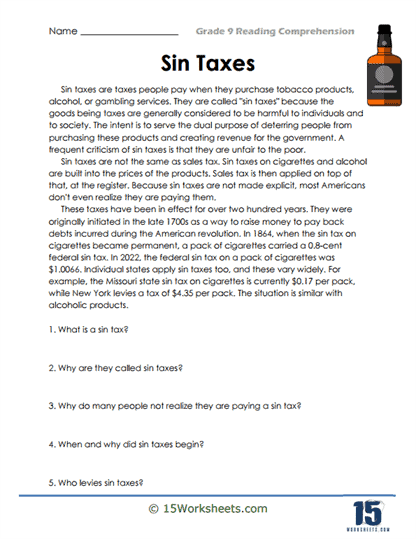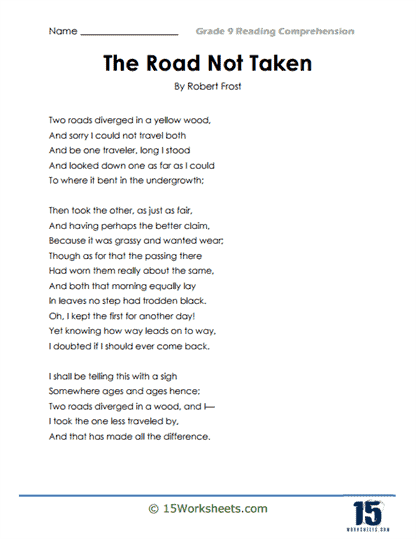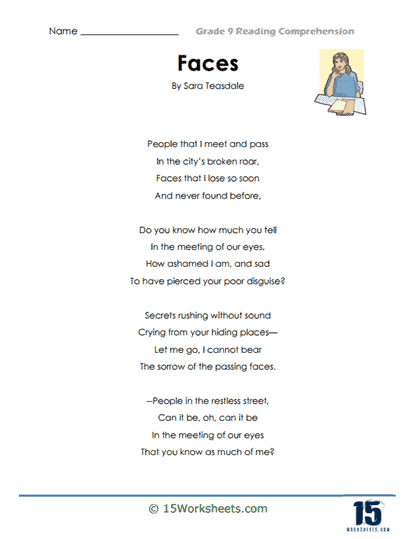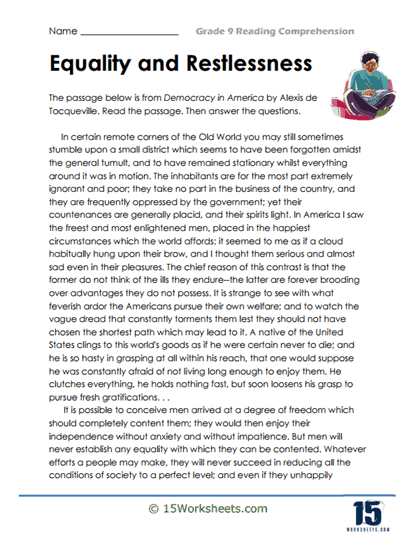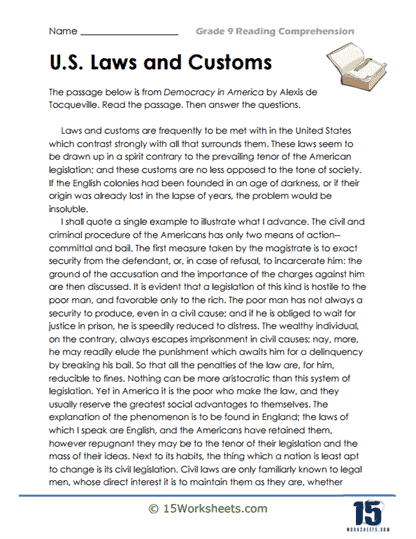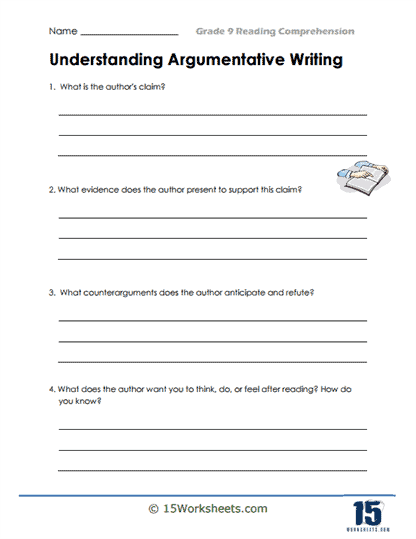Grade 9 Reading Comprehension Worksheets
All About These 15 Worksheets
The purpose of these worksheets is to cultivate and refine the reading comprehension and analytical skills that are essential for students at the 9th-grade level. As students progress through their academic journey, their intellectual capacity and ability to engage with complex texts must evolve. These worksheets are designed specifically to match the growing demands of high school curricula, offering more sophisticated reading materials and challenging students to think critically about what they read.
In contrast to worksheets tailored for younger students, the 9th-grade versions delve deeper into the intricacies of both literary and informational texts. Each worksheet typically features a passage-be it a novel excerpt, a scientific article, a historical document, or even a piece of poetry or drama-that is rich in meaning and complexity. The goal is not only to expose students to a variety of genres but also to help them develop the skills needed to navigate different types of writing.
After presenting the text, the worksheets often include a series of multiple-choice or identification questions aimed at testing students’ comprehension of the material. These questions challenge students to recall specific details, identify central themes, and understand the context in which particular words or phrases are used. These seemingly straightforward questions serve an important role: they ensure that students are actively engaging with the text, paying attention to key details, and building a solid foundation of comprehension.
The series goes well beyond basic recall. They also feature open-ended questions that demand higher-order thinking. These questions encourage students to draw inferences, make connections between different parts of the text, and analyze the author’s use of literary elements like tone, symbolism, and theme. For example, a student might be asked to compare the motivations of two characters or to explore how the structure of a passage-such as the use of flashbacks or parallel narratives-contributes to its overall meaning. By grappling with these questions, students begin to engage with texts on a deeper level, moving beyond surface comprehension and into critical analysis.
The ability to think critically is a vital skill, not just for success in high school, but for life. These worksheets aim to nurture that skill by requiring students to support their responses with evidence from the text. Whether they are asked to interpret figurative language, examine an author’s word choice, or evaluate the emotional impact of a passage, students must learn to ground their interpretations in concrete examples from the reading. This practice of providing textual evidence is essential, as it teaches students how to construct well-reasoned arguments, a skill that will serve them well in both academic and real-world contexts.
In addition to fostering critical thinking, these worksheets often include sections that focus on vocabulary development. By introducing students to more advanced vocabulary and asking them to infer the meaning of unfamiliar words from context, the worksheets help students expand their language skills. Moreover, students are taught to differentiate between connotation and denotation, recognizing the subtle shades of meaning that words can carry based on their usage. This ability to understand and interpret language with nuance is crucial as students encounter increasingly sophisticated texts.
By the time students reach 9th grade, they should be able to read fluently and engage critically with a wide range of texts. Whether they are tackling a classic novel, a technical document, or an abstract poem, they should be able to analyze and interpret complex themes. Their vocabulary should be robust enough to handle challenging words, and they should be capable of making inferences, drawing conclusions, and identifying elements such as tone, mood, and symbolism. In addition, 9th graders should be able to evaluate the credibility of sources, distinguish between objective facts and subjective opinions, and recognize biases within texts. These skills are foundational not just for reading comprehension but for becoming informed, critical thinkers in all areas of life.
The worksheets collection is thoughtfully designed to address these multifaceted skills. The texts included in these worksheets cover a broad range of topics and genres, ensuring that students are exposed to a diverse array of ideas and writing styles. From informational articles to literary excerpts, from poetry to historical essays, the worksheets push students to read with a critical eye, deepening their understanding of different genres and improving their overall literacy skills.
Each worksheet is structured around a central passage, followed by a series of questions that guide students through the process of comprehension and analysis. These questions are deliberately varied, targeting different levels of understanding. Some focus on main ideas, helping students grasp the big picture, while others zero in on specific details, encouraging careful, attentive reading. Still, others ask students to interpret more abstract concepts, such as the themes or the author’s tone and purpose. By addressing these various aspects of reading comprehension, the worksheets aim to foster a more holistic understanding of texts.
What makes these worksheets particularly effective is their balance between factual and creative texts. By including both, students are given the opportunity to engage with different forms of writing. Informational texts help students practice analyzing data and extracting key points from factual narratives, an important skill in our information-driven world. On the other hand, literary texts-such as poems or excerpts from novels-invite students to explore deeper layers of meaning. Through these texts, students learn to identify literary devices like metaphor, simile, and symbolism, and to reflect on how these elements shape the reader’s emotional response.
The open-ended nature of many of the questions encourages students to think critically and creatively. Rather than simply asking for a summary of the text, these questions prompt students to analyze characters, explain historical or cultural references, or assess the significance of certain events or themes. In doing so, students are pushed to move beyond surface-level comprehension and to engage with the text on a deeper level. This kind of analysis not only improves their reading skills but also helps them develop the ability to think critically about the world around them.
Another key aspect of these worksheets is their focus on real-world applications. Many of the questions encourage students to make connections between the text and broader societal or philosophical ideas. For instance, a historical document might prompt students to reflect on how past events influence the present, while a literary excerpt could inspire a discussion about universal human experiences. By encouraging these connections, the worksheets help students see the relevance of what they are reading and foster the kind of critical thinking that will be essential throughout their lives.
What Reading Skills Should A High School Freshman Master?
In high school, freshmen should strive to master several important reading skills to strengthen their comprehension and overall literacy. Firstly, expanding vocabulary is crucial, as it enables students to grasp the meaning of complex texts. They should actively learn new words, utilize context clues, and make use of resources like dictionaries and word lists.
Active reading is another vital skill, involving strategies such as previewing, annotating, and note-taking to engage with texts actively. By doing so, students improve their comprehension, identify main ideas, and establish connections within the text.
Identifying the main idea or central theme of a text is essential. Freshmen should develop the ability to understand the primary message or argument presented and summarize it succinctly.
Additionally, students should learn to analyze the structure of a text, recognizing different formats like cause and effect, compare and contrast, problem and solution, and chronological order. This skill helps them comprehend and organize information effectively.
The capacity to make inferences and draw conclusions is critical. Students should practice inferring information not explicitly stated and justifying their conclusions using evidence from the text.
Evaluating arguments is another important skill, where students learn to critically analyze the credibility, relevance, and logic of the arguments presented in texts. This involves identifying persuasive techniques, biases, and logical fallacies.
Understanding the author’s purpose and tone is key to comprehending texts thoroughly. Students should be able to discern the author’s intention, whether it is to inform, persuade, entertain, or provoke.
Additionally, they should identify the tone of the text, which contributes to understanding the intended message and evaluating the author’s perspective.
Developing research skills is crucial for academic success. Freshmen should learn to locate reliable sources, extract pertinent information, and synthesize findings effectively. This equips them with the necessary tools for assignments and helps them become knowledgeable readers.
Encouraging critical reading involves questioning and challenging the text, considering diverse perspectives, and forming independent opinions. This skill promotes independent thinking and enhances analytical abilities.
Finally, contextual understanding is important for comprehending texts within their historical, cultural, and social contexts. It allows students to uncover deeper meanings and appreciate diverse perspectives in literature and informational texts.
How Can Grade 9 Students Improve Their Reading Skills?
Improving reading skills in 9th grade is a critical step in a student’s academic development, laying the foundation for more advanced literacy and critical thinking. At this stage, students are often introduced to more challenging and diverse texts, ranging from classical literature to contemporary works, each with unique themes, structures, and vocabulary. To truly excel in reading comprehension, it’s essential for students to engage deeply with these materials, not just on a surface level but in a way that fosters critical analysis and thoughtful reflection.
One effective strategy for improving reading skills is to explore a wide array of texts. This means not limiting oneself to just one type of genre or author but diving into both classic literature and modern writings. By reading novels from different time periods and cultural backgrounds, students expose themselves to a broader range of writing styles, themes, and perspectives. Classic literature, for instance, often contains complex language and historical contexts that require a more thoughtful approach to understand. On the other hand, contemporary writings, including novels, articles, and essays, tend to reflect current societal issues, making them more relatable but no less challenging. Reading widely helps students develop a more well-rounded perspective on both literature and the world around them.
Participating in discussions about what they read is another powerful tool for enhancing comprehension. Joining study groups or book clubs allows 9th graders to share insights, ask questions, and hear how others interpret the same material. Engaging in such conversations can provide fresh perspectives that a student might not have considered on their own. For example, a classmate might interpret a character’s motives differently or identify a theme that wasn’t immediately apparent. These critical discussions foster a more interactive approach to reading, turning it from a solitary activity into a dynamic exchange of ideas. Moreover, explaining their interpretations to others forces students to articulate their thoughts clearly and coherently, reinforcing their own understanding of the text.
Annotation is another essential technique that helps students actively engage with what they are reading. Rather than passively skimming through a text, students can use annotation to highlight key passages, underline unfamiliar words, and write down their immediate reactions or questions in the margins. This practice transforms reading into an active process, where students are constantly thinking about the text and making connections. For example, if a student comes across a confusing sentence or a word they don’t understand, they can circle it and come back to it later, or look it up in the dictionary. Similarly, by highlighting important sections or writing notes on how certain parts make them feel, students create a roadmap of their thought process throughout the text, which they can revisit later for deeper analysis.
Breaking down complex sentences or paragraphs into simpler terms is another effective strategy for improving reading comprehension. Many texts that students encounter in the 9th grade, especially in classical literature or academic articles, contain intricate sentence structures or dense information. Instead of getting overwhelmed by the complexity, students can practice paraphrasing the content in their own words. By summarizing what they’ve read, students ensure that they truly understand the material and aren’t just glossing over it. This technique is particularly helpful when dealing with abstract themes or figurative language, as it forces students to translate sophisticated ideas into terms they are more familiar with.
Creating a conducive environment for reading is another important factor in enhancing focus and comprehension. In today’s world of constant distractions, it’s easy to lose focus when trying to read challenging material. Setting aside distractions such as phones or social media, and finding a quiet, comfortable space, can greatly improve concentration. A distraction-free environment allows students to immerse themselves in the text, making it easier to absorb the material. It also helps to establish a regular reading routine, where students dedicate specific times of the day to reading without interruptions. This practice not only improves their ability to focus but also creates a habit of regular engagement with texts.
Consistency is key when it comes to improving reading skills. Regularly reviewing and reflecting on what they’ve read ensures that students don’t simply forget material after they’ve finished it. One way to do this is by keeping a reading journal, where they can jot down their thoughts, summarize the main points, and note any lingering questions they have about the text. Journaling encourages active reflection, as students are required to think critically about what they’ve read and articulate their thoughts in writing. It also provides a useful reference tool that they can look back on when studying for exams or writing essays.

